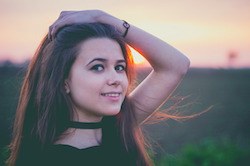Emotional Chords: How To Tell Stories With Chords
 Are you looking for emotional chords? Would you like to tell a story every time you play?
Are you looking for emotional chords? Would you like to tell a story every time you play?
Would you like your listeners to feel like they’ve been on an incredible journey every time you sit down at your instrument?
Well this article and video should help.
We talk all the time about jazz theory on this site because it’s an important tool to help you understand the structure of this amazing style of music.
Although jazz theory is an amazing tool, it does have 1 limitation. It involves us using primarily our left brain to organize our sounds.
You don’t want to only use 1 side of your brain when you make music right?
How To Tell Stories With Your Chords Video
Take 3 minutes and watch the video to get started and then read below for the rest of the story…
How To Tap Into Your Musical Creativity
 On it’s highest level, music should stimulate both sides of the brain. Music is creative. Music is emotions. Music is the story of our lives. And creativity comes from the right side of our brain.
On it’s highest level, music should stimulate both sides of the brain. Music is creative. Music is emotions. Music is the story of our lives. And creativity comes from the right side of our brain.
So, one way that I’ve used to get my right brain/creativity more involved in the music making process, is to think about every chord voicing I learn as a subtle emotion, or a piece of a story.
For example, you may know 10 different ways of playing a major chord.
Most people just lump them all together and think about them the same because they’re all major. But this is a big mistake!
You see if you listen deeply enough, even though they’re all major harmonies, they all have very big differences in sound and emotion.
There’s tons of subtleties and emotions colors beyond just the basic chord quality.
Once you have the ability to tap into these subtleties this is where the magic starts to happen.

If you’re emotionally aware of the sounds then you can always choose the perfect chord to play in your music.
And when you always choose the perfect emotional chords, audiences love it because you’re connecting with them.
And this ability to connect, is one of the big differences between an an average player and a great player.
An average player plays stock voicings all the time. They don’t adjust their voicings based off EXACTLY the emotional story that needs to be told in the moment.
How To Tap Into Emotional Chords On A Deeper Level
 So, lets get specific for a second. Lets say you that you see in a chord chart that you need to play and it’s a major chord.
So, lets get specific for a second. Lets say you that you see in a chord chart that you need to play and it’s a major chord.
And lets say the music is going along and at that moment in the music you want to reflect a positive feeling.
Well, there’s tons of different positive emotions! And they all feel different. As you’re reading this think about how each of them feel. For example:
- Caring
- Pride
- Ecstasy
- Sentimental
- Relief
- Joy
- Calm
- Excited
- Hope
- Amused
- Satiated
Can you see how they’re all positive but they all feel very different? Ecstasy feels very different than calm. Sentimental feels very different than satiated.
So, you can’t just lump them all together as positive. They all feel differently.
And the same is true with different chords and chord voicings. You shouldn’t just play a stock major chord every single time.
If the music is calling for an “ecstasy” moment and you play a “calm” chord then you’ve used the wrong sound entirely.
You’re not telling the story that needs to be told.
So, going forward yes, you should think about your chords in relation to music theory.
 But, you should also start organizing your chords in terms of emotions. It’s much more right brain but you’ll be able to connect much more deeply with your listeners.
But, you should also start organizing your chords in terms of emotions. It’s much more right brain but you’ll be able to connect much more deeply with your listeners.
And that’s what music is all about at the highest level. Expression and connection.
Take your listeners on a wonderful journey. With many emotional peaks, valleys, twists, and turns.
Tell your story. Be you!
Your Next Ascension Step
 If you’re new to jazz and want to learn my simple system for getting the best jazz chords under your belt then check out this very special program right here.
If you’re new to jazz and want to learn my simple system for getting the best jazz chords under your belt then check out this very special program right here.
Alright let me know how it goes in the comments area. Are there some emotional chords that you really connect with? If you have questions just leave a comment below. I’m happy to help.
Have fun with all this. It’s an exciting approach to sound and it will change your musical life.
